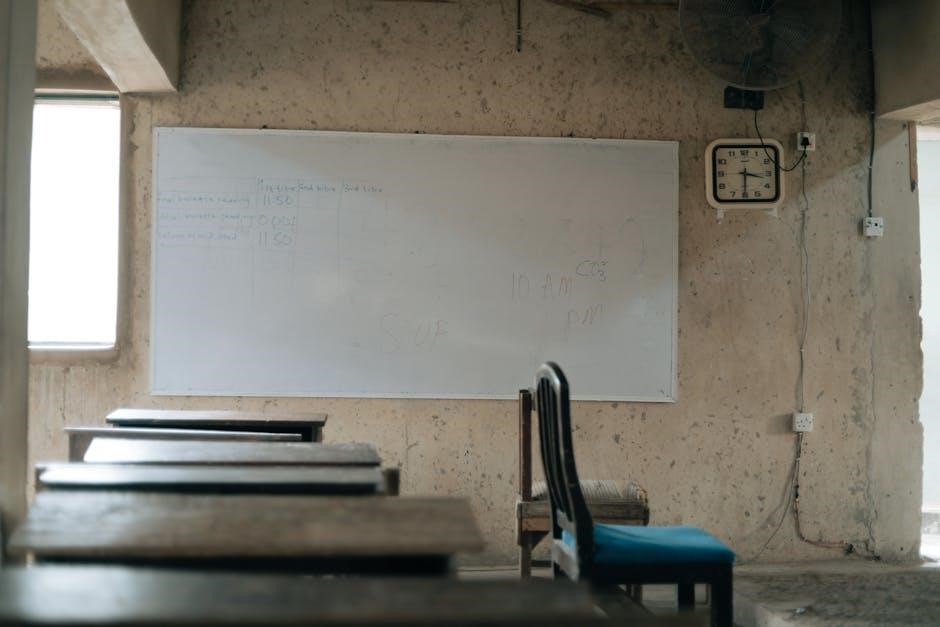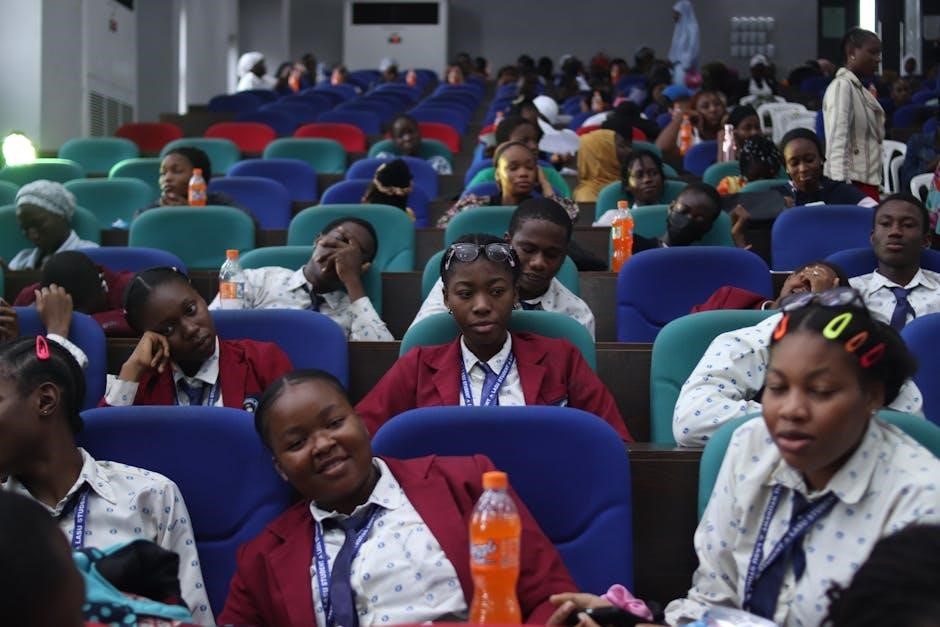SchoolBegin is a leading platform providing up-to-date school news in Nigeria and free educational guides for students, parents, and educators, empowering them with essential resources and insights.
Overview of SchoolBegin as a Platform

SchoolBegin is an innovative online platform designed to provide comprehensive school news in Nigeria and offer free educational guides to students, parents, and educators. It serves as a central hub for up-to-date news, updates, and resources related to education in Nigeria. The platform also provides free educational guides, including study tips, information on choosing the right school, and the importance of extracurricular activities. These resources are tailored to assist students, parents, and educators in making informed decisions and improving educational outcomes. SchoolBegin addresses the unique challenges faced by the Nigerian education system by offering relevant and actionable information. By bridging the information gap, SchoolBegin plays a crucial role in fostering an informed and empowered educational community. Overall, SchoolBegin is committed to enhancing education in Nigeria through accessible and reliable information.
Importance of School News in Nigeria
School news in Nigeria plays a vital role in keeping stakeholders informed about educational developments, policies, and opportunities. It bridges the gap between schools, students, parents, and the community, fostering engagement and transparency. Through platforms like SchoolBegin, students gain access to updates on exams, scholarships, and innovative programs, empowering them to make informed decisions. School news also highlights success stories, inspiring learners and celebrating achievements. Additionally, it addresses challenges such as funding and infrastructure, sparking dialogue for systemic improvement; By staying connected to school news, Nigerians can advocate for quality education, ensuring a brighter future for the nation’s youth.

Understanding the Nigerian Education System
Nigeria’s education system is structured into primary, secondary, and tertiary levels, managed by the Ministry of Education, aiming to provide quality education for national development and individual growth.
Structure of Primary Education in Nigeria
Primary education in Nigeria is compulsory and serves as the foundation for the country’s education system. It typically lasts for six years, starting from the age of six. The curriculum focuses on basic subjects like English, mathematics, science, and social studies, aiming to equip pupils with essential skills. Schools are divided into Key Stage 1 (Primary 1-3) and Key Stage 2 (Primary 4-6). Assessment includes continuous evaluation and promotional exams. The structure emphasizes holistic development, preparing students for secondary education. Challenges such as funding and infrastructure often affect the quality of education in public schools, but efforts are being made to improve access and standards across the country.
Secondary Education System in Nigeria
In Nigeria, secondary education is a critical phase that follows primary schooling, typically lasting six years. It is divided into two stages: Junior Secondary School (JSS) and Senior Secondary School (SSS). The JSS curriculum focuses on broad-based subjects, while SSS specializes in science, arts, or commercial fields. Students sit for the National Examination Council (NECO) and West African Examination Council (WAEC) exams at the end of SSS to qualify for tertiary education. Secondary schools in Nigeria face challenges such as inadequate funding, infrastructure deficits, and teacher shortages, which impact learning outcomes. Despite these issues, secondary education remains vital for preparing students for future opportunities and contributing to the nation’s development. The quality of secondary education is a key focus for reforms aimed at improving Nigeria’s education system. Addressing these challenges is essential for ensuring equitable access to quality secondary education nationwide.
Tertiary Education in Nigeria

Tertiary education in Nigeria encompasses universities, polytechnics, and colleges of education, providing advanced learning opportunities. Universities focus on academic and professional programs, while polytechnics emphasize practical skills. Admissions are competitive, with JAMB exams playing a key role. Despite challenges like funding and infrastructure, tertiary institutions produce skilled graduates. Recent updates highlight efforts to integrate ICT, enhancing learning experiences. Schools like Mona School inspire innovation, reflecting global trends. The integration of technology, as seen in online ethnographies, showcases Nigeria’s adaptability. These advancements align with global educational shifts, ensuring Nigerian tertiary education remains relevant. By addressing systemic issues, Nigeria aims to strengthen its higher education system, fostering a brighter future for students.

Latest School News in Nigeria
Nigeria’s education sector witnesses dynamic changes, with recent policy reforms, technological advancements, and innovative programs shaping the future of learning for students across the country.
Recent Updates on Educational Policies
Nigeria has introduced new educational policies aimed at improving access and quality in schools. These include measures to enhance teacher training programs and integrate digital tools into classrooms. The government has also emphasized the importance of vocational training to prepare students for the workforce. Additionally, there is a focus on curriculum reform to include more practical skills and modern subjects. These updates reflect a commitment to addressing the evolving needs of students and educators, ensuring a more holistic approach to education. By staying informed through platforms like SchoolBegin, stakeholders can better navigate these changes and support educational progress in Nigeria.
Impact of Technology on Nigerian Schools
Technology has revolutionized education in Nigeria, with digital classrooms and e-learning platforms becoming increasingly popular. Schools are adopting tools like online portals and mobile apps to enhance learning experiences. Internet access has improved research capabilities for students, while virtual classrooms bridge gaps in remote areas. However, challenges remain, such as limited electricity and internet connectivity in rural schools. Despite these hurdles, technology is fostering innovation, enabling personalized learning, and preparing students for a digital future. Many institutions now integrate ICT into curricula, promoting digital literacy. This shift is transforming traditional teaching methods, making education more accessible and engaging. As technology advances, its role in Nigerian schools will continue to expand, addressing longstanding educational challenges and creating opportunities for growth. The integration of technology is a cornerstone of modern education, driving progress and innovation in Nigeria’s schooling system.
Role of Media in Disseminating School News
The media plays a pivotal role in disseminating school news in Nigeria, ensuring that stakeholders remain informed about educational developments. Traditional media platforms like newspapers, radio, and television provide widespread coverage of school events, policy changes, and academic achievements. Digital media, including online news portals, blogs, and social media, further amplify the reach of school news, making it accessible to a broader audience. Platforms like SchoolBegin leverage these media channels to share updates on exams, scholarships, and educational reforms. Additionally, media helps in highlighting challenges faced by schools, such as funding issues and infrastructure deficits, prompting public discourse and potential solutions. By fostering transparency and engagement, the media contributes to the growth of Nigeria’s education sector, ensuring that students, parents, and educators stay connected to vital information.

Free Educational Guides for Students
SchoolBegin offers free guides on exam preparation, study techniques, and career choices, helping students in Nigeria succeed academically and beyond through accessible resources.
How to Choose the Right School
Choosing the right school is a critical decision that shapes a student’s academic and personal growth. Academic reputation and curriculum offerings are essential factors to consider. Parents should assess the school’s teaching methods and how they align with their child’s learning style. Additionally, extracurricular activities and support services play a significant role in holistic development. Location and accessibility are also important to ensure convenience and safety. Visiting schools, meeting teachers, and understanding their values and mission can provide valuable insights. Finally, feedback from current students and alumni offers firsthand experiences, helping families make an informed decision. SchoolBegin provides detailed guides to simplify this process, ensuring families find the best fit for their educational needs.
Effective Study Tips for Students
Effective study habits are crucial for academic success. Start by creating a structured study schedule and stick to it, ensuring consistent learning. Prioritize active learning techniques, such as engaging in discussions or teaching others, to deepen understanding. Use flashcards and summaries to review key concepts regularly. Incorporate technology, like educational apps, to enhance learning. Practice time management by breaking tasks into smaller, manageable chunks. Stay organized with a dedicated study space free from distractions. Engage in regular breaks to avoid burnout and maintain focus. Seek help from teachers or peers when needed, and utilize online resources like SchoolBegin for additional support. Finally, stay motivated by setting achievable goals and rewarding progress. These strategies can significantly improve academic performance and overall success.
Importance of Extracurricular Activities
Extracurricular activities play a vital role in shaping students’ holistic development. They foster creativity, leadership, and social skills, complementing academic learning. Engaging in sports, clubs, or cultural events enhances teamwork, discipline, and problem-solving abilities. These activities also provide platforms for students to explore their passions and build confidence. Additionally, extracurricular involvement often correlates with improved academic performance and better time management. Schools in Nigeria are increasingly recognizing the value of these activities in preparing students for future challenges. By participating in extracurricular programs, students can develop a well-rounded personality and gain experiences that contribute to their personal and professional growth. SchoolBegin emphasizes the significance of these activities, offering guides to help students and parents understand their benefits and how to get involved effectively.

Challenges in Nigerian Education
Nigeria’s education system faces challenges like inadequate funding, poor infrastructure, and insufficient teacher training, affecting quality and accessibility for many students nationwide.
Funding Issues in Nigerian Schools

The persistent underfunding of Nigerian schools remains a critical challenge, impacting the quality of education. Many public schools struggle with inadequate resources, outdated infrastructure, and insufficient instructional materials. Lack of sufficient funding hinders the implementation of modern teaching methods and limits access to technology. Despite government allocations, corruption and mismanagement often divert funds, leaving schools under-resourced. This financial shortfall disproportionately affects rural and disadvantaged areas, widening the educational gap. To address this, increased budgetary allocations and transparent financial management are essential. Additionally, partnerships with NGOs and private sectors can help bridge the funding gap, ensuring Nigerian schools receive the support needed to provide quality education for all students. Addressing funding issues is crucial for fostering an equitable and effective educational system in Nigeria.
Infrastructure Challenges in Schools
Nigerian schools face significant infrastructure challenges, including overcrowded classrooms, inadequate furniture, and limited access to basic facilities like libraries and laboratories. Many schools lack proper electrical and water supplies, creating an unfavorable learning environment. These issues hinder academic performance and student engagement, as learners often struggle with inadequate resources. Additionally, poor maintenance of school buildings and insufficient technology integration further compound the problem. These challenges are particularly pronounced in rural areas, where schools may lack even the most basic infrastructure. Addressing these issues is crucial to improving education quality and ensuring students have access to the resources they need to succeed. SchoolBegin highlights these challenges and provides actionable guides to help stakeholders advocate for better infrastructure and support for Nigerian schools.
Teacher Training and Development
Teacher training and development are critical to enhancing the quality of education in Nigeria. Many educators lack access to continuous professional development, which hinders their ability to deliver effective instruction. Schools often face challenges such as limited funding, inadequate infrastructure, and insufficient resources for teacher training programs. However, initiatives like workshops, seminars, and online courses are being implemented to address these gaps. Non-governmental organizations (NGOs) and educational platforms like SchoolBegin play a significant role in providing free guides and resources to support teacher development. These efforts aim to equip teachers with modern pedagogical skills, enabling them to meet the evolving needs of students. By prioritizing teacher training, Nigeria can build a stronger foundation for its education system, ensuring better learning outcomes for future generations.

Opportunities in Nigerian Education
SCHOOLBegin highlights emerging opportunities in Nigerian education, including scholarship programs, NGO partnerships, and ICT integration, fostering innovation and accessibility for students nationwide.
Scholarship Opportunities for Students
SchoolBegin highlights numerous scholarship opportunities for Nigerian students, offering financial support for academic pursuits. These scholarships are designed to bridge the gap between potential and resources, enabling students to achieve their educational goals. Many organizations, governmental bodies, and private institutions provide these funds to deserving candidates. Students can explore opportunities such as the Federal Government Scholarship, international scholarships, and awards from NGOs. Eligibility criteria often include academic excellence, placement exams, and financial need. SchoolBegin provides detailed guides on how to apply, required documents, and deadlines, ensuring students maximize their chances. By leveraging these opportunities, students can focus on their studies without financial burdens, fostering a brighter future for themselves and their communities. Stay updated with SchoolBegin to discover the latest scholarship programs tailored to Nigerian students.
Role of NGOs in Education
Non-governmental organizations (NGOs) play a vital role in enhancing education in Nigeria by addressing gaps in funding, infrastructure, and resources. Many NGOs, such as the Mona School initiative, focus on providing scholarships, training teachers, and improving learning environments. They often collaborate with local communities to ensure sustainable development in education. NGOs also advocate for policy reforms and community involvement, fostering a culture of education. Their efforts have significantly impacted marginalized areas, ensuring access to quality education for underprivileged students. By bridging the gap between government efforts and grassroots needs, NGOs continue to be instrumental in shaping a brighter educational future for Nigeria.
Integration of ICT in Schools
The integration of Information and Communication Technology (ICT) in Nigerian schools has revolutionized education, enhancing teaching and learning processes. SchoolBegin highlights how digital tools, such as interactive whiteboards and online learning platforms, are transforming classrooms. Many schools now adopt e-learning solutions, enabling students to access resources globally. This shift has improved engagement and academic performance, especially in STEM subjects. Partnerships with NGOs and private sectors have facilitated the deployment of ICT infrastructure, bridging the digital divide. Despite challenges like limited internet access in rural areas, the gradual adoption of ICT promises a brighter future for Nigeria’s education system, fostering innovation and preparing students for a tech-driven world. SchoolBegin continues to advocate for increased investment in ICT to ensure equitable access for all students.

Policy and Reforms in Education
Policy and Reforms in Education focus on improving Nigeria’s educational framework through government initiatives, curriculum updates, and community involvement to enhance learning outcomes and accessibility for all students.
Government Policies on Education
The Nigerian government has introduced several policies to enhance the education system, focusing on accessibility, quality, and equity. Key initiatives include the Universal Basic Education (UBE) program, aimed at ensuring compulsory primary and junior secondary education nationwide. Additionally, policies like the National Policy on Education emphasize the integration of ICT and vocational training to prepare students for modern challenges. SchoolBegin actively tracks and disseminates updates on these policies, providing insights into their implementation and impact. The platform also offers guides to help stakeholders navigate policy changes effectively. By staying informed, students, parents, and educators can align with government directives and leverage opportunities for improved educational outcomes. SchoolBegin remains a trusted source for understanding how these policies shape Nigeria’s educational landscape. Stay updated with SchoolBegin for the latest on government-led educational reforms and initiatives.
Curriculum Development in Nigeria
Curriculum development in Nigeria is a structured process aimed at aligning educational goals with national priorities. The Nigerian Educational Research and Development Council (NERDC) oversees the development of curricula for primary, secondary, and tertiary institutions. The 9-3-4 system emphasizes foundational knowledge at primary levels, with a focus on core subjects like mathematics, English, and science. At the secondary level, students are introduced to a broader range of subjects, preparing them for further education or vocational training. Recent reforms have emphasized the integration of digital literacy and entrepreneurship to address modern challenges. Stakeholders, including educators and policymakers, collaborate to ensure curricula are relevant and adaptive to societal needs. Challenges include implementation inconsistencies and outdated content, but ongoing efforts aim to enhance the quality and relevance of education in Nigeria.
Community Involvement in Schools
Community involvement in schools plays a vital role in fostering a supportive learning environment. By engaging parents, local organizations, and stakeholders, schools can address challenges and enhance educational outcomes. In Nigeria, community participation often includes volunteering, fundraising, and mentorship programs that bridge gaps in resources. Schools benefit from collective efforts, such as infrastructure improvements and extracurricular activities. This collaboration strengthens trust between schools and communities, ensuring a shared commitment to student success. Effective community involvement also promotes cultural awareness and social responsibility, preparing students for active citizenship. SchoolBegin highlights such initiatives, offering guides on how communities can contribute meaningfully to education. Through shared goals, schools and communities can create a brighter future for Nigerian students.
SchoolBegin has revolutionized access to Nigerian school news and educational guides, empowering students, teachers, and parents with vital information and resources for academic success and growth.
Future of Education in Nigeria
The future of education in Nigeria looks promising, with a growing emphasis on technology integration and innovative learning methods. Schools are adopting digital tools to enhance teaching and learning experiences, ensuring students are better prepared for the global workforce. Government initiatives and policies aim to improve access to quality education, particularly in underserved regions. Community involvement and partnerships with NGOs are also playing a crucial role in addressing infrastructure and funding challenges. Additionally, there is a rising focus on vocational training and skills development to equip students with practical knowledge. As Nigeria continues to prioritize education reform, the sector is expected to see significant progress, fostering a more educated and empowered generation. SchoolBegin remains a key resource, providing updates and guides to support this transformative journey.
Final Thoughts on SchoolBegin
SchoolBegin stands as a transformative platform, offering unparalleled access to Nigerian school news and free educational guides, empowering students, parents, and educators alike. By bridging information gaps and fostering engagement, it addresses critical challenges in Nigeria’s education system. The platform’s commitment to innovation and accessibility ensures it remains a vital resource for learning and growth. As education evolves, SchoolBegin is poised to continue shaping the future of Nigerian schooling, inspiring brighter opportunities for all. Its impact is undeniable, making it an essential tool for anyone navigating the educational landscape in Nigeria.
